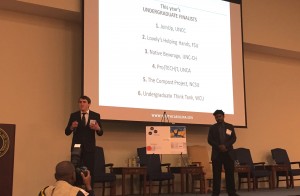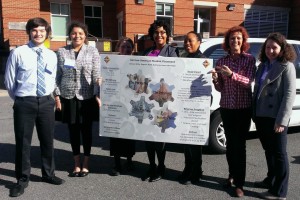Entrepreneurs are noted for showing initiative and openness to taking risks, as they craft innovative solutions to problems.
This drive to address societal challenges proved compelling for three UNC Charlotte student teams competing in the UNC Social Entrepreneurship Conference at North Carolina A&T State University in February, 2015. The teams returned from the experience with an unwavering commitment to tackle society’s problems.
The statewide competition challenges students from the UNC campuses to consider issues, come up with solutions and present their business cases. Ventureprise, a venture development organization located in the PORTAL building at UNC Charlotte and funded in part by the university, worked with the Small Business and Technology Development Center to help the UNC Charlotte teams prepare.
For the team that developed an initiative called JoinUp, the competition provided an opportunity to showcase the start-up web-based network, which provides a way for student entrepreneurs to connect with each other
 “Through JoinUp.co, we’d like to aid in the creation of new college startups throughout Mecklenburg County, expanding later into North Carolina and the rest of the United States,” said Neil Emmett, a political science major and one of the team’s leaders. “We want to make it simple and easy to find college students to start businesses with locally.”
“Through JoinUp.co, we’d like to aid in the creation of new college startups throughout Mecklenburg County, expanding later into North Carolina and the rest of the United States,” said Neil Emmett, a political science major and one of the team’s leaders. “We want to make it simple and easy to find college students to start businesses with locally.”
Emmett and teammates Christian Wilks, Jaimin Patel and Gautam Shrikrishna founded JoinUp because of their personal experiences in trying to find partners with complementary expertise.
“When I started college, one of the big things I had was a lot of ideas,” Emmett said. “And I wasn’t alone. As I spoke to students I learned pretty fast that I wasn’t the only one with ideas. I wanted to build all kinds of things from websites to motion sensors for the UNC Charlotte parking lots. What I quickly noticed however, was that by myself I didn’t have the qualifications to make my ideas happen. So I searched and searched. It took me six months to find the right partners. Finding students that share in your passions and that have the qualifications to get it done is tough.”
A second project team, led by Denise Jackson, a senior majoring in German and sociology, created German American Student Placement (GASP), which seeks to establish a non-profit agency that connects students and educational institutions with German-American businesses for apprenticeships. The hope is to provide local businesses the skilled workforce they need to be successful.
“This competition allowed me to apply what I learned in some of my sociological courses and create a solution to problems plaguing our society,” Jackson said. “GASP recognizes that there is a mid-skill gap, stagnant upward social mobility, and a youth unemployment crisis. Our solution addresses all three issues.”
Jackson worked with Taylor White (History and German), Madeline Degrace (Economics and German), Stephen Bend l (Mathematics and Statistics and German), German faculty member Anabel Aliaga-Buchenau, and two community leaders; Brigitte Hartenstein (CFO of STEAG Energy Services, LLC) and Sherri Barnes-Jones (Citizen Schools Fellow).
l (Mathematics and Statistics and German), German faculty member Anabel Aliaga-Buchenau, and two community leaders; Brigitte Hartenstein (CFO of STEAG Energy Services, LLC) and Sherri Barnes-Jones (Citizen Schools Fellow).
The third team of graduate students is developing The Social Traveler’s Program “to make a more attractive trade-off between alternative modes of transportation, in order to reduce single-person car use,” according to its business proposal. Team members were Coline Dony, Emmanuel Bello-Ogunu, Daniel Yonto and Osarieme Omokaro.
The team proposed that transportation modes that are shared – such as train, bus, and carpool – and/or low-emission – such as biking and walking – hold enormous social, environmental and economic benefits. Still, in most settings, the convenience and benefits of a personal car outweigh the convenience of any other form of travel.
The team’s project has started with a phase called Royalty for Loyalty, with a mobile phone application that would create an incentive to increase public transit ridership through a rewards program. The free smartphone app would allow users to track miles traveled on Charlotte Area Transit System. Users could exchange their points for discounts and awards at local businesses, events and exhibits, or for their next public transit fare.
“Our app would also incorporate transit-related games to further stimulate participation and strengthen a sense of community as riders can play these games with passengers around them,” the proposal stated. “Safety and quality ratings of transit routes and their stops will give users a way to engage and provide their input on existing services, which would be a beneficial source of data for CATS.”
UNC Charlotte teams found the statewide competition provided an important opportunity to gain knowledge and feedback.
“Competition gives individuals the opportunity to expand their horizons and the means to create change in our society,” Jackson said. “The idea of entrepreneurship is scary. There are a lot of unknown variables, but it gets easier. Instead of waiting for the powers that be, take the bull by the horn and step out on a limb.”
The JoinUp team found the judges’ feedback an essential part of the process. “One of the key things my team likes to focus on is learning from experience,” Emmett said. “After the competition we questioned every judge we could find on how we could improve our pitch and our concept. It was a great way to develop our ideas further.”
More information regarding the 2016 conference will be available in October, at www.ventureprise.org. While the competition is business-oriented, students from all majors are encouraged to participate to build a well-rounded team. In this year’s competition, students were majoring in the humanities, social sciences, information technology and engineering fields.
Words: Tyler Harris, CLAS Student Communications Assistant
Images: Courtesy of Denise Jackson and Neil Emmett








